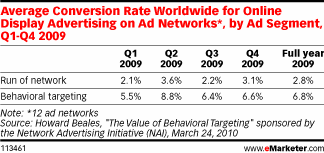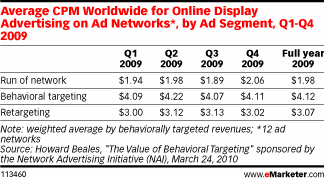 While behaviorally targeted ads have been heavily criticized by privacy advocates, the data from a 2009 Network Advertising Initiative (NAI) study suggest that they will continue to be used by marketers and publishers.
While behaviorally targeted ads have been heavily criticized by privacy advocates, the data from a 2009 Network Advertising Initiative (NAI) study suggest that they will continue to be used by marketers and publishers.
Here are the 2 main highlights from that 2009 NAI study.
1. Behaviorally targeted ads have higher conversion rates than regular ads.

eMarketer indicates that among users who clicked on a behaviorally targeted ad, 6.8% converted. That compared with only 2.8% of those who clicked on a run-of-network ad. That means that behaviorally targeting doubles the effectiveness of an online ad.
While it appears that ad clickers found behavioral ads more relevant (hence the higher conversion), this is just a hypothesis because the NAI did not study how likely they were to click in the first place, a key component of effectiveness. Still the data strongly supports that those who click, convert at a higher percentage than that of regular ads.
2. Behaviorally targeted ads are more expensive than regular ads.

This is not a surprise. Better conversion rates mean higher CPMs.
The 2009 NAI study shows that CPM rates were significantly higher for behaviorally targeted ads, with the average price of a behaviorally targeted ad 2.68 times greater than that of a run-of-network ad.
Takeaway
Behaviorally targeted ads have high value to both publishers and marketers so they will continue to be used, despite the criticism from privacy groups.

One thought on “Behavioral Targeting Doubles Ad Effectiveness”
Comments are closed.